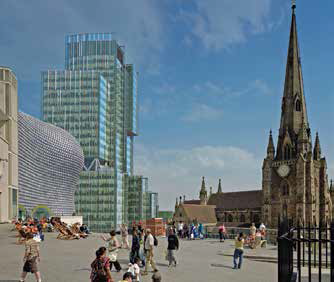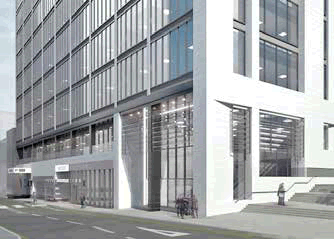
10.1 The BDP sets out how the City will develop over the period to 2031, identifying where the homes, jobs, services and infrastructure will be delivered and the type of places and environments that will be created. Having set out a clear direction for how the City will develop, and the planning policies and proposals that will help achieve this, it will be important that there are tools in place to help implement these and ensure the successful delivery of the overall vision for Birmingham.
10.2 In implementing the policies and proposals within the BDP the private sector will have a key role to play in both the funding and delivery of development.
10.3 The City Council will equally have an important role to play and will make use of all appropriate mechanisms including:

10.4 Each policy within the BDP is accompanied by a table providing a summary of the key mechanisms
that will be used to support their implementation covering one or more from the list of aspects identified above. These key implementation mechanisms are summarised as follows:
10.5 Over the lifetime of the BDP it is likely that new initiatives, partnerships and sources of funding will emerge that will play a new role in helping to implement proposals and deliver growth. The following provides examples of some of the specific mechanisms that are currently and will continue to play a key role in the short to medium term in ensuring the BDP is successfully implemented and growth delivered.
Local and national funding
10.6 One of the key aspects for the successful delivery of the BDP will be the provision of infrastructure to
enable and support development. There are a range of funding options that can be utilised to support the infrastructure and environmental improvements that are required to enable the delivery of the overall strategy and support sustainable growth.
Post and Mail Phase 2

10.7 Enterprise Zone - The City Centre was designated an EZ in April 2011 as part of the national initiative to boost economic growth. The benefits on offer include business rates relief, simplified planning and enhanced marketing. The primary benefit however is the retention of business rates generated within the zone and the ability for the LEP to recycle these into supporting its economic priorities. In the case of the City Centre EZ the LEP has already committed a first phase of funding of £128m to support delivery.
10.8 The European Regional Development Fund (ERDF) - is one of the European Union’s structural funds and is aimed at addressing imbalances in economic performance within and between member states.
10.9 The Regional Growth Fund (RGF) - is a Government challenge fund to encourage private sector
growth and new jobs, particularly in areas and communities currently dependent on the public sector.
10.10 The City Deal for Birmingham - is an agreement with Government that gives the City new powers to build infrastructure, create jobs and train local people with the right skills to fill them.
10.11 Development will be expected to provide or make a contribution to the cost of providing what is necessary to support the new development.
10.12 These contributions will be sought in line with Circular 05/2005, Community Infrastructure Levy regulations or successor regulations/guidance. The City Council will, where appropriate, seek to secure site specific measures through planning obligations. The nature and scale of any planning obligations sought will be related to the form of development and its potential impact on the site and surrounding area. Infrastructure and mitigation measures will be provided in a timely manner to support the objectives of the Local Plan, and will ensure any new developments will provide the infrastructure, facilities, amenities and other planning benefits which are necessary to support and serve the development, and to offset any consequential planning loss to the local area which may result from the development. Developer contributions in the form of the Community Infrastructure Levy will contribute towards strategic infrastructure to support the overall development in the BDP.
| Policy TP47 Developer contributions | ||||||||||||||
Development will be expected to provide, or contribute towards the provision of:
Implementation
|
10.13 Planning Obligations - such obligations under Section 106 of the Town and Country Planning Act 1990 (as amended) will continue to be used as a mechanism to make development proposals acceptable in planning terms, that would not otherwise be acceptable. Section 106 agreements will continue to be used to secure affordable housing, and on site public open space in residential development, ensure the development or use of land occurs in specific ways; and require specified operations or activities to be carried out.
10.14 Community Infrastructure Levy - the Community Infrastructure Levy (CIL) came into force in April 2010 and allows local authorities in England and Wales to raise funds from developers undertaking new building projects in their area. The CIL is a set levy based upon the type of use and floorspace proposed and provides a standardised method for calculating contributions. The money can be used to fund a wide range of infrastructure that is needed as a result of development. This includes new or safer road schemes, flood defences, schools, hospitals and other health and social care facilities, park improvements, green spaces and leisure centres. The City Council adopted CIL in 2016 to support the delivery of the sustainable growth agenda set out in the BDP.
Inward investment
10.15 Alongside securing funding for infrastructure the ability to attract private sector investment will be central to the overall success of the BDP. The City Council will continue to take a proactive and constructive approach to potential local, national and international investors. There are likely to be particular challenges in achieving this with the pace of recovery of the national economy a key issue but one directly outside the City Council’s control. The City Council will however continue to work actively in promoting Birmingham and the opportunities on offer, for example, through the Big City Plan and the Area Investment Prospectuses, to ensure that the City is best placed to take advantage of improved economic conditions whenever they arrive. Securing the EZ status and promoting the Economic Zones will provide a focus for economic activity and help target inward investment.
Partnership working
10.16 While the City Council has a key role to play in delivering the policies and proposals responsibility does not rest solely with the City Council and it will require the combined efforts and investment of a range of partners.
10.17 The successful implementation will require a wide range of organisations to work together. The City Council will have a vital role in coordinating the actions and activities of these partners be they in the private, public or third sector.
10.18 The LEP will have a central role in supporting the delivery of the overall growth agenda for Birmingham. Local Enterprise Partnerships are led by businesses and local authorities across natural economic areas. They provide the vision, knowledge and strategic leadership required to drive sustainable private sector growth and job creation in their areas. The LEP for the Greater Birmingham and Solihull area was formed in 2010 and is a businessled initiative with local authority, the business community and educational providers represented. Those local authorities covered by the LEP are Birmingham City Council, Bromsgrove District Council, Cannock Chase District Council, East Staffordshire Borough Council, Lichfield District Council, Redditch Borough Council, Solihull Metropolitan Borough Council, Tamworth Borough Council and Wyre Forest District Council.
Duty to Co-operate
10.19 The Duty to Co-operate is a requirement of the Localism Act 2011 and is designed to ensure that all bodies involved in planning work together on strategic issues that are greater than local significance. The duty is particularly important and challenging for a major city like Birmingham where its influence spreads far beyond its administrative boundaries. It is also challenging to those authorities surrounding Birmingham especially in relation to the accommodation of growth that cannot be met within the City’s administrative boundary.
10.20 In relation to the local authority dimension of the Duty to Co-operate the City Council works collaboratively through the West Midlands Joint Committee (which brings together the seven districts in the West Midlands metropolitan area), The LEP and West Midlands Planning Officers Group. In addition to these groups the City Council works on a bi-lateral basis with all adjoining local authorities not only on the challenges faced by Birmingham but also in relation to the emerging plans in those adjoining areas.
10.21 The co-operation through the LEP has been particularly important. A Spatial Plan for Recovery and Growth is being progressed for the LEP area. This has included the joint commissioning of technical studies to inform the long term scale and distribution of growth. The intention of these studies is to sit alongside the progress being made by the current round of development plans - including the BDP - but also to help inform subsequent updating of plans.
10.22 This collaborative working has also been taken forward in bilateral discussions with adjoining authorities where there are strong connections with Birmingham including the Black Country and North Warwickshire.
Use of City Council powers
10.23 The City Council has a range of powers that are available to help support delivery. This will not just be confined to those of the planning system but also the housing, education and highway functions it provides.
10.24 Compulsory Purchase Powers are an important tool for local authorities and other public bodies to assemble land to help deliver social and economic change. The City Council has a strong track record in utilising these powers to support urban regeneration schemes and the delivery of infrastructure and will continue to apply these powers where the acquisition of land is necessary to enable comprehensive schemes that deliver economic, social and/or environmental benefits.
10.25 The City Council has extensive landholdings within Birmingham and will seek to use these to take forward the strategy, whether through development promotion or through the protection and improvement of environmental assets.
10.26 The preparation of more detailed plans to guide delivery in areas of change has proved to be successful in the past and will continue. Wherever possible the City Council will aim to make use of SPDs, AAPs, Neighbourhood Development Plans and regeneration frameworks to provide local and site specific policy and promote a comprehensive approach to development initiatives. The Development Planning and Development Management roles of the City Council will remain an important delivery mechanism.
Infrastructure Delivery Plan and Site Delivery Plan
10.27 The BDP is supported by an Infrastructure Delivery Plan (IDP) and Site Delivery Plan which provide detail of the infrastructure necessary to enable growth to occur and delivery issues in relation to key proposals. The City Council will keep these documents under review to measure progress and ensure funding, initiatives and action are targeted.
10.28 Combining all these mechanisms with the policies and proposals set out in the BDP will enable the successful delivery of the vision for an enterprising, prosperous, innovative and green City.
< Previous | ^ Top | Next >